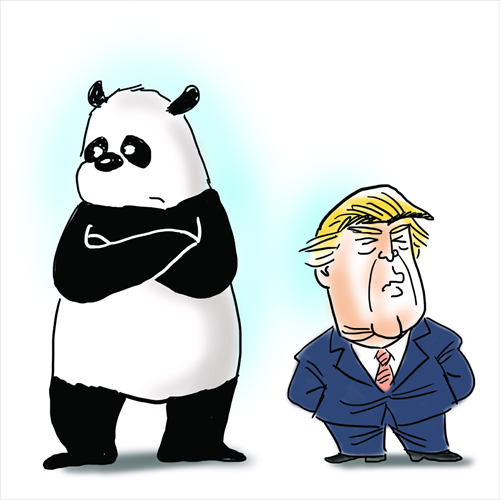Trump’s closed US would overshadow China’s future

Illustration: Shen Lan /GT
In a recent Financial Times podcast about the ongoing US election campaign, Martin Wolf, the paper's chief economics commentator, was quite emotional. What could be read out from his tune was a genuine concern about the shock to the established Western system brought about by Donald Trump's populism.
Currently, this concern is shared by elite across the Atlantic. Last weekend, the strong gains made by German's anti-immigrant Alternative für Deutschland in regional elections are just the latest demonstration of Europe's similar symptom. But the causes for the similar scenario in the US and Europe are different: For the EU, it is the refugee crisis for continental Europe, and long-lasting doubt about the EU project for Britain; and for the US, it is the long-standing immigration problem, the distrust for outsiders and an impulse of isolationism.
As a contrast, the major reception of Trump in China so far has been more like spectator psychology. To some extent, the public's general reaction is not significantly different from the AlphaGo fad created by Google. The underlying perceptions are similar, unfamiliar, a bit funny, but most importantly, remote with little impact on one's own lives. While the dramatization of campaign politics by Trump does resemble reality TV, it's far more dangerous than just a show.
What makes Trump really troublesome is the support he has managed to seize with his bare hands. Trump's campaign has ridden on the anger of many Americans towards globalization, which they believe has benefitted the elite only but shared the cost with all. Trump didn't hesitate to say that maintaining the existing world order is more a burden to the US than something fundamental to the country's role in the world.
Though Trump may in the end fail to find the path to the White House, the very fact that a significant part of the US electorate is hoping to "make America great" again by taking a more nationalistic approach is surely a problem that the world needs to spend more time on. For China, whose connection with the world is now essential to its interests, understanding the full implication of the Trump phenomenon is also a pressing task.
Ever since the reform and opening-up policy was set more than three decades ago, the underlying logic of China's policy has not seen much significant change. The country firmly believes it can benefit most by deeply integrating with the world. China's approach to the world order is clear, namely to embrace it, fine-tune it if necessary, but not to overthrow it. As the existing world order to a large extent is underwritten by the US, China's relationship with the US therefore has seen a stable development as a whole.
Moreover, for the last three decades, each time when China tried to find solutions to its own problems, the focus was always put on the domestic. For both China's policymakers and intellectuals, self-reform is seemingly the constantly correct choice for the country's future.
Against this backdrop, it won't be difficult to realize what's at stake for China if the US starts to become more hesitant in terms of keeping its international promises.
The distrust of a significant part of the US public for a deeper-connected world may be translated into concrete policies. To say the least, a possible Trump administration is set to put free trade and the international flow of people into question.
Most Chinese, who have already become used to the ever-widening reach of globalization, would find it difficult to imagine a harsher, more closed West.
In a recent Financial Times opinion article titled "Donald Trump, Viktor Orban and the west's great walls," Gideon Rachman lamented Westerners' increasing isolationism. Referring to Trump's demand for a "great, great wall" along its border with Mexico and the EU's panic over the migrant crisis, the author argued that "there is a loss of faith in the ability to engage successfully with the outside world."
China should be clear that this possible Western failure to engage with the world won't be easily transformed into its own success.
The author is an editor with People's Daily. opinion@globaltimes.com.cn